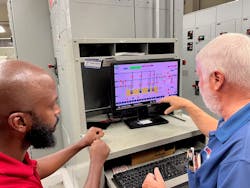Rural Water responds to Jackson’s water crisis
When the City of Jackson, Miss. entered a water emergency, the Mississippi Rural Water Association took part in the nationwide effort to help the city’s water system recover, as stated in the National Rural Water Association’s latest story.
On August 29, 2022, the City of Jackson announced in a press release that the O.B. Curtis Water Plant was having issues treating water due to heavy rain causing the Pearl River to flood. The water treatment issues led to a decrease in water production, resulting in low water pressure for most connections, especially buildings with multiple stories or levels. Water storage tanks emptied and refilled slowly over days as pressure returned to normal.
That same day, Mississippi Governor Tate Reeves announced the state would be taking over efforts to restore Jackson's water system as more than 180,000 residents were left without running water. Jackson, the capital of Mississippi, has been dealing with problems stemming from old water infrastructure for years.
Mississippi Emergency Management Agency (MEMA) took over incident command for the crisis and began calling multiple organizations to form an emergency response team. Among the first to be called was to Kirby Mayfield, Mississippi Rural Water Association (MsRWA) CEO. Their mission is to provide leadership, training programs, technical assistance and services to the state's utility systems. MsRWA is an affiliate of the National Rural Water Association (NRWA), a federation of 50 State Rural Water Associations.
Randy Turnage, MsRWA Deputy CEO, said the Rural Water network answered the call and they are receiving more offers to help every day. Among the first water experts on the scene were local operators from Mississippi, as well as several out-of-state operators from Louisiana, Georgia, and Florida.
The water operators were dispatched to begin initial recovery steps and were instrumental in responding to the crisis, according to Mayfield. "We could not have done it without them," he said. MsRWA has been instrumental in establishing a mutual aid assistance program for water utilities in the state, which was imperative in this situation.
During a press conference after the crisis, Jackson Mayor Chokwe Antar Lumumba recognized that the National Rural Water Association marshaled resources through its emergency response Mutual Aid Assistance Network.
"We will continue to be working in conjunction with them. We continue to be a part of the team, not only now but moving forward," Lumumba said.
First steps for water experts on-site included meeting with MEMA and other first responders to formulate an emergency action plan and delegate tasks to each organization. MsRWA quickly began evaluating the water system and identifying areas of low pressure, finding ways to build the pressure back up to refill the tanks.
State Rural Water Associations routinely provide hands-on training in operations and maintenance to small, rural, and disadvantaged water systems across the nation. The expertise developed from troubleshooting problems at thousands of systems each year is invaluable during emergency response.
In a press conference on September 5, Gov. Reeves said, "We've thanked those individuals from Louisiana, Georgia and Florida Rural Water Associations that are here. They are providing tremendous support to this effort. I also want to thank Kirby Mayfield and the Mississippi Rural Water Association who have been engaged and involved throughout this process."
Gov. Reeves acknowledged the importance of bringing in resources from other states and utilizing FEMA's EMAC (Emergency Management Assistance Compact). He further noted that leveraging MsRWA's access to local utilities is especially helpful.
On September 7, a little over a week after the state took over the system, the City of Jackson announced in a press release that the O.B. Curtis Water Plant remained at a steady pressure for 24 hours and had effectively restored the water supply in tanks that had been depleted the previous week.
Mayfield said the main concern now is monitoring water lines and detecting leaks, because pipes may burst when going from an extremely low pressure back to a higher, more normal pressure.
Disaster Emphasizes Workforce Challenges
MsRWA will stay in constant contact with MEMA and other emergency responders from now until the crisis is resolved, but Mayfield and Turnage agree the ultimate lesson is to give water and wastewater operators the credit they deserve.
"Jackson, like every other city in America, is dealing with workforce issues," Mayfield said. "The operators and maintenance staff there should be recognized for"We have to pay these people like they are professionals, so they won't leave when another new opportunity arises," he said.
According to the Occupational Informational Network (O*NET), a national occupation salary database, water and wastewater professionals in Mississippi are paid almost $10,000 less than the national average salary.
In addition to increasing professional demands, utilities will soon be forced to replace many of their most experienced employees. Over the next decade, the water sector is expected to lose between 30 and 50 percent of the workforce to retirement.
Turnage said a great way to combat an aging and depleted workforce is the NRWA Apprenticeship Program. This program is approximately a 2-year training program facilitated by NRWA's state affiliates. There are currently 34 participating states, including Mississippi.
"Apprenticeship is desperately needed in this industry," Turnage said. "We have to increase our workforce within the industry, regardless of the system's size and technical issues. Apprenticeship is a great thing for the systems to participate in and replenish the workforce."
With limited water and wastewater professionals, MsRWA has proven itself as a resource for emergency response and technical assistance within the state of Mississippi. With the help of surrounding states, Rural Water came together in a time of need for Jackson and will continue to aid in any way possible.
To learn more about the NRWA Apprenticeship program, visit this link. Interested readers can also contact their State Rural Water Association for more information about becoming an apprentice or involving your system in the apprenticeship program.


